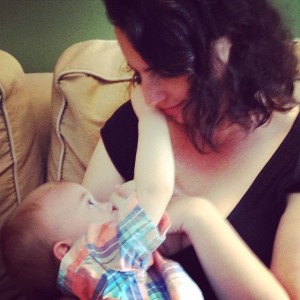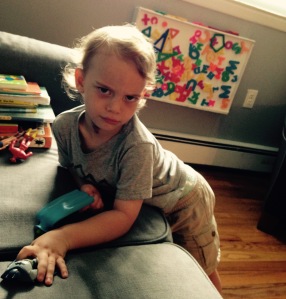I am so pleased to introduce Christine Organ, a fabulous writer and friend!
What I love about Christine is how honest and genuine she is, both as a writer and as a person. As I read her beautiful book, Open Boxes: the gifts of living a full and connected life , I felt like I was being let into her mind. I watched her wrestle with questions of life, faith, parenting, marriage, and friendship. She goes deep. She says it all. And she does it with generosity and elegance. Her stories are relatable, but don’t shy away from brutal honesty. She writes about postpartum depression, eating disorders, anxiety, childhood pain, and finding herself as a writer. I really enjoyed this book, and I had the pleasure of asking Christine some questions about her writing process, and other fun stuff.

Q&A With Christine Organ
Q: I am always fascinated with how parents (but mothers specifically, because I am one!) fit writing into their busy lives. What are your writing routines like? How did you manage to write an entire book while keeping two kids alive under your roof?
A: Finding the time and space – let alone the energy – to write is a constant challenge. While my specific routines have changed over time and vary depending on my children’s schedules, I generally try to write while they are at school or sleeping. I wrote my book over a 2-3 year period so it was written in short spurts. Thirty minutes here, a couple hours there.
During the school year, it is much easier to follow a general writing routine. My oldest son is in school all day and my youngest son is in preschool (soon to be kindergarten!) in the afternoon, so I block out that time in the afternoon for writing time. My mother-in-law also spends the morning with my younger son one day a week, which helps create a big chunk of time for tackling bigger projects.
This summer has presented a new challenge in that I am not only struggling to find time to write, but motivation. It’s hard to sit down at the computer when I would much rather be going to the pool or taking a trip to the lake. I do feel a bit antsy and eager to get back into a regular writing routine, but I am reminding myself that it’s okay to step back from my writing for a few months in order to enjoy this season of our lives. Come September I hope to hit the ground running again.
Q: I love how you cover such a broad range of subjects in the book, and the way that they all interact with each other to form a cohesive whole. Did you know you were writing the book as you completed each essay? How did you figure out the structure of the book?
A: Not at all! When I first started blogging, it was to create a platform for a very different book I had in mind. While that book never materialized, through blogging, I discovered my voice and the stories I really wanted to tell. Fairly quickly after I started blogging, I realized that I wanted to write a book about grace – the ways that it manifests itself and the profound impact that it can have on our lives. Over time, I noticed the common theme of openness and connection in several of the stories I wanted to tell. I also realized that wonder and the celebration of life’s little miracles were a big part of connection so I included those sections as well. With the theme of connection, the stories came together as one cohesive unit.
Q: You write about very personal subjects like postpartum depression and eating disorders. How do you feel about sharing these stories with the world?
A: It is definitely scary, but it gets easier over time. I am realizing that when we share the truth about ourselves, including the darker parts, we empower other people to accept their own truth as well. When we share our own war stories, so to speak, we are telling people that it’s okay that they accept their own war stories too. Not only that, but there is incredible freedom in owning the darker stories in our lives. By putting something out there, sharing these pieces of ourselves, we diffuse a bit of the power they hold over us.
That’s not to say that it stops being difficult. A few weeks ago, I shared an article on my Facebook page about eating disorders and I actually hesitated about posting it. I was scared to acknowledge that I have (and sometimes still do) deal with body image issues. What will people think of me?, I thought. Will people think less of me? And then I remembered all the things I wrote in “Open Boxes” about telling our stories and acknowledging our struggles. I wrote a whole chapter about eating disorders, for heaven’s sake! The cat’s out of the bag. And yet, there is a tendency to gloss over any lingering issues. I wanted to be able to say I beat this; it’s done. But life doesn’t work that way. I am a work in progress. I strive to live a life of authenticity and that means acknowledging the good and the bad, the beauty and the pain, the bitter and the sweet.
Q: What have been the biggest surprises since having the book published? What’s next for you?
A: I think one of the biggest – and best – surprises to me has been the diversity of people who have read and appreciated Open Boxes. As a woman and a mother, many of the stories resonate with women and mothers, but several men and non-parents have also told me how much they enjoyed the book. People from a wide range of backgrounds and faith traditions have found resonance in the book. This means a lot to me because one of my primary goals in writing “Open Boxes” was to find commonalities in the human condition, to draw on the ways we are more alike than different (while still celebrating our differences), and the wide range of readers has reinforced this for me.
Another big surprise to me is the amount of work it takes to actually sell a book. The marketing and promotional work is never-ending! I still feel very uncomfortable marketing myself, which can make it difficult. But I’m getting better at it.
Right now I’m focused on spreading the word about “Open Boxes” – speaking, book events, etc. – and there is always the writing that I do on my own website and on other (larger) websites, but I’m starting to think about possibly dipping my toes back into the book writing process soon. I’ve got some ideas brewing that I need to flesh out, but I’m hoping to throw myself into a new book project soon.
***
I highly recommend delving into Christine’s book yourself. You can order it here.
And here’s a bit more about Christine, including links to her blog and where else you can find her.

Christine Organ is the author of Open Boxes: the gifts of living a full and connected life — a collection of stories that celebrate the human spirit. She lives in Chicago with her husband, two sons, and two dogs. Her work has appeared on The New York Times, the Washington Post, Huffington Post, UU World, Scary Mommy, The Mid, Role Reboot, and Mamalode. She writes at www.christineorgan.com. You can also find her on Facebook and Twitter.
***
Connect with me on Facebook and Twitter!















